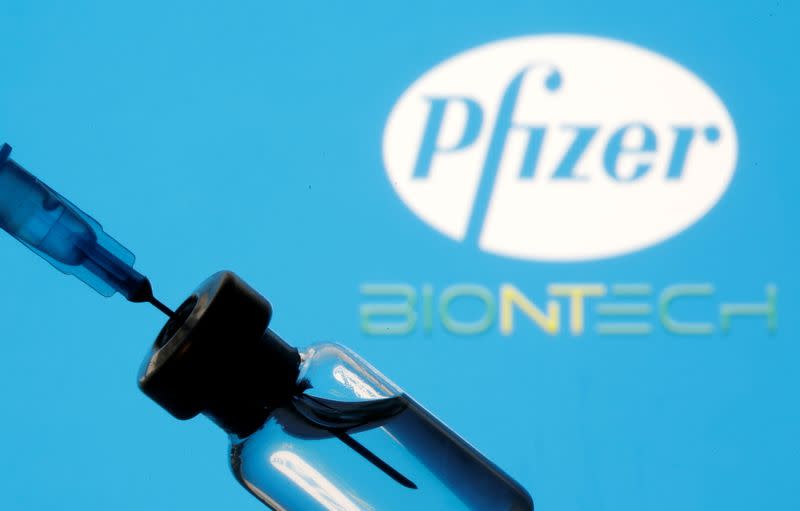By Nancy Lapid
(Reuters) – The following is a summary of some of the latest scientific studies on the new coronavirus and efforts to find treatments and vaccines for COVID-19, the disease caused by the virus.
The South African variant may withstand current antibody treatments
The variant of the new coronavirus identified in South Africa may resist or “escape” antibodies that neutralize previous versions of the virus, the scientists found. It “exhibits complete escape” of three classes of monoclonal antibodies manufactured to treat patients with COVID-19, and shows “substantial or complete” resistance to neutralizing antibodies in the blood donated by COVID-19 survivors, the scientists reported Tuesday. fair at bioRxiv before peer review. Similarities between the South African variant and another variant identified in Brazil suggest that the Brazilian variant will show similar resistance, they added. Liam Smeeth, from the London School of Hygiene and Tropical Medicine, who was not involved in the study, noted that these were laboratory tests and it would not be wise to extrapolate the results to humans at this point. “The data raises the possibility that the protection obtained from previous infection with COVID-19 may be less for reinfection with the South African variant,” he said. “The data also suggests that existing vaccines may be less effective against the South African variant.” He called for large studies among populations where the variant is common. (https://bit.ly/3sLeIgP)
Pfizer / BioNTech shot probably protects against the UK variant
The COVID-19 vaccine from Pfizer Inc and BioNTech SE probably protects against the most infectious variant of the virus discovered in Britain and now spreading around the world, according to laboratory tests. The researchers collected blood samples from 16 people who received the vaccine and exposed the blood to a synthetic virus, or pseudovirus, which was designed to have 10 mutations found in the UK variant. The antibodies that developed in response to the vaccine effectively neutralized the pseudovirus, according to a report published on Tuesday in bioRxiv before the peer review. “This makes it very unlikely that the UK variant will escape the protection provided by the vaccine,” said Jonathan Stoye, a virus scientist at the Francis Crick Institute in Britain who was not involved in the research. Similar experiments are needed with the most worrying variant first found in South Africa, he suggested. AstraZeneca Plc, Moderna Inc and CureVac NV are also testing whether their respective vaccines will protect against rapidly spreading variants. (https://bit.ly/35X6Wa4; https://reut.rs/3p1TCZz)
The immune system will remember how to make COVID-19 antibodies
People who have recovered from COVID-19 can probably mount a quick and effective response to the virus if they find it again, because the “B cells” in their immune system will remember how to make the antibodies needed to fight it, shows a new study. The researchers followed 87 survivors of COVID-19 for six months and found that although the levels of antibodies against the virus may decrease over time, the number of memory B cells remains the same. The antibodies produced by these cells are more potent than the patients’ original antibodies and may be more resistant to mutations in the spike protein that the virus uses to enter cells, they said. For example, they found that antibodies can recognize and neutralize at least one of the mutations in the South African variant of the virus that has caused concern among health experts. Even if antibody levels drop, B cells will remember how to produce them when needed, according to study leader Michel Nussenzweig of Rockefeller University, whose findings were published Monday in Nature. If that is true in six months, as in this study, it is safe to assume that it is probably still true for longer periods, he added. People who have recovered from COVID-19 “can be infected, but the immune system will be prepared to fight the infection,” said Nussenzweig. (https://go.nature.com/3nWtwWo)
Higher mortality when ICUs are full of COVID-19 patients
The fuller an intensive care unit (ICU) is with patients with COVID-19, the higher the mortality rate among these patients, new data suggest. When researchers followed the results of 8,515 COVID-19 patients admitted to 88 U.S. Department of Veterans hospitals in 2020, they found that survival rates improved between March and August. Over the study period, however, the risk of death was almost double when at least 75% of the ICU beds were occupied with COVID-19 patients, compared to when they represented a maximum of 25% of the ICU beds. Mortality from COVID-19 “increases during periods of peak demand,” said Dr. Dawn Bravata of Richard L Roudebush VA Medical Center in Indianapolis, who co-led the study published Tuesday in the JAMA Network Open. “The more the public can do to prevent infections, the better,” she added. In addition, Bravata said, “facilities within a health care system or within a geographic region should collaborate to screen seriously ill patients with COVID-19 to locations with greater ICU capacity to reduce stress in any facility.” (https://bit.ly/3oYfWDa; https://bit.ly/35VHpOk)
Open https://tmsnrt.rs/3a5EyDh in an external browser to see a Reuters graph of vaccines and treatments under development.
(Reporting by Nancy Lapid, Linda Carroll, Kate Kelland and Ludwig Burger; edited by Bill Berkrot)
